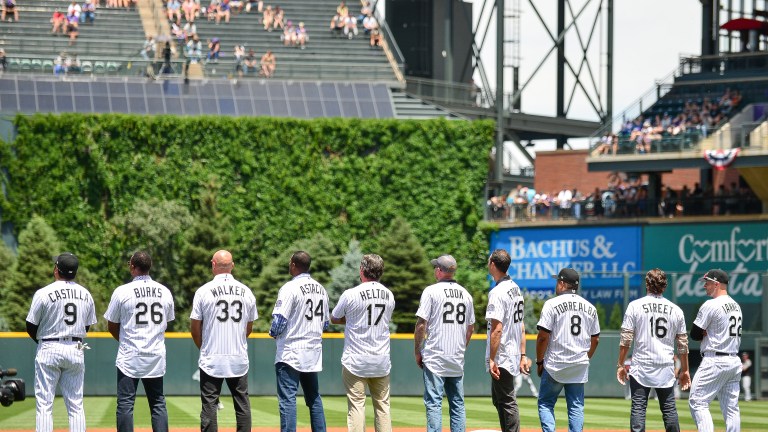Will Todd Helton Put Coors Field Question to Rest for Hall of Fame?
The Colorado Rockies could be getting their second Hall of Famer very soon, with Todd Helton trending towards induction to Cooperstown.

If some of the leading Baseball Hall of Fame prognosticators are to be believed, this is the last voting cycle that former Colorado Rockies first baseman Todd Helton will need to ensure his enshrinement in Cooperstown. In his sixth season on the Hall of Fame ballot, Helton earned 72.2 percent of the vote last year. With 75 percent needed to reach Cooperstown and early voting certainly trending in the right way, Helton seems to be bound for baseball immortality in the coming weeks.
However, with Helton comes the question of Coors Field and how the eye-popping numbers he produced in his 17 years with the Rockies (the only team he ever represented) were impacted by altitude. It’s a stigma that every Colorado player has had to endure when the worthiness of his Hall of Fame induction has been raised. Larry Walker finally broke through those questions on his 10th and final vote, and Helton seems to be on a quicker path than his former teammate.
The stigma of altitude was once again put in the forefront for baseball fans on Monday when well-known MLB writer and insider Jon Heyman released his ballot, leaving Helton off it. In Heyman’s words, “Nothing against overheated Coors Field, but the bulk numbers aren’t quite there for a first baseman in that atmosphere.”
It’s clear that Heyman may be looking at Helton not reaching the 400-homer mark (finishing his career with 383) and other metrics, but when “overheated” and “atmosphere” are used when rejecting a player, it’s clear that playing baseball at a mile high influences this voter and very likely others.
If you need reasons why Helton belongs in the Hall of Fame, MLB.com’s Manny Randhawa laid out the argument beautifully here. One of the things I appreciate about that piece is that Coors Field is stripped out of Helton’s numbers for one comparison, and just what the first baseman did away from Denver is seemingly enough to earn him a spot in Cooperstown, especially with the OPS and OBP statistics.
The biggest question for the future becomes when and if Coors Field will not be a black mark against a player who spent all or most of his career there.
With Walker and Helton both wearing Colorado Rockies hats on their busts, it’s clear Colorado’s place in the overall history of baseball is secure. But what about future Hall of Fame questions around players such as Nolan Arenado or DJ LeMahieu?
Both have accomplishments that will draw the attention of some voters down the road, but how much will their time in Denver impact those decisions?
Playing in Colorado is a unique challenge for those who hope to make it to Cooperstown one day. On one hand, you may be looked down upon if you put up big numbers because of “altitude.” However, based on Heyman’s comments, expectations are always raised because of playing in Denver as well. Hit too many homers? “Coors Field!” Don’t hit enough? “Should’ve hit more because of Coors Field!”
How do we members of the BBWAA (and, yes, I include myself in there as I will have a Hall of Fame vote soon) put our own biases aside and focus on the right numbers, no matter where that player resided?
That’s the toughest riddle of all to solve apparently, especially when both coasts can have their own bias. However, for players like Arenado, LeMahieu and more to come, the question of their candidacy can’t just be based on Coors Field statistics. Otherwise, we voters are missing a key piece of the puzzle and not giving some of the great hitters of our generation their just due.
When Helton earns his place in the Baseball Hall of Fame, it’s another step toward recognizing the great players who have showcased their skills in Denver. However, it’s also clear that there are plenty more steps to go before players such as Arenado and LeMahieu (and all of the future Rockies to come) aren’t examined perhaps more than they need to be.
